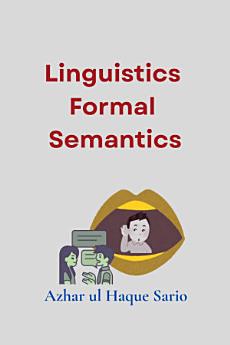Linguistics Formal Semantics
About this ebook
What sets Linguistics Formal Semantics apart? It’s not just another textbook—it’s a groundbreaking exploration. Other books often recycle standard introductions or focus narrowly. This one pushes boundaries with innovative angles. It reimagines set theory for linguistics, not just math. Propositional logic becomes a cognitive model, not a dry system. Lambda calculus is the “engine” of meaning, vividly illustrated. Montague Grammar is presented as a living paradigm, not history. The book tackles gaps others ignore, like fuzzy categories or complex quantifiers. It balances rigor with clarity, making advanced concepts accessible. Cross-linguistic data and psycholinguistic evidence ground the theory. No other text integrates cognitive science, computation, and semantics so seamlessly. It’s award-worthy for its depth and originality. Whether you’re a student, researcher, or curious mind, this book offers unparalleled insights. It’s a conversation between logic, language, and thought, inviting you to rethink meaning itself.
The journey begins with the philosophical and cognitive origins of formal semantics, asking why we need formal systems to understand language. You’ll explore the Principle of Compositionality as a cognitive hypothesis, backed by experimental data. Truth-conditional semantics is dissected, with its strengths and limits laid bare. Set theory is reinvented to model linguistic relations, while predicate logic unveils propositions’ inner structure. Quantification in natural language gets a fresh look, with scope ambiguities revealing Logical Form. Lambda calculus and type theory drive composition, with vivid examples like adjectives and determiners. Montague Grammar’s homomorphism principle ensures syntax and semantics align. The lexicon’s structure explains entailments and restrictions. Generalized Quantifiers handle “most” and “few” with mathematical precision. Intensionality introduces possible worlds for modality and belief. Tense, aspect, and modality intertwine in complex sentences. Plurality and anaphora push beyond single clauses. The book closes by connecting semantics to syntax, pragmatics, and computational linguistics, pointing to future frontiers.
Copyright Disclaimer: This book, Linguistics Formal Semantics, is independently produced by the author and has no affiliation with any board or organization. All references to existing frameworks, theories, or concepts are made under nominative fair use for educational and scholarly purposes.
About the author
Azhar ul Haque Sario is a bestselling author and data scientist with a remarkable record of achievement. This Cambridge alumnus brings a wealth of knowledge to his work, holding an MBA, ACCA (Knowledge Level - FTMS College Malaysia and London College of Accountancy, London), BBA, and several Google certifications, including specializations in Google Data Analytics, Google Digital Marketing & E-commerce, and Google Project Management.
With ten years of business experience, Azhar combines practical expertise with his impressive academic background to craft insightful books. His prolific writing has resulted in an astounding 2810 published titles, earning him the record for the maximum Kindle editions and paperback books published by an individual author in one year, awarded by Asia Books of Records in 2024.
ORCID: https://orcid.org/0009-0004-
https://www.linkedin.com/in/






